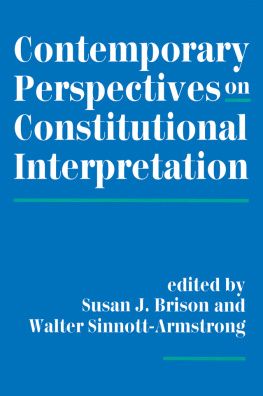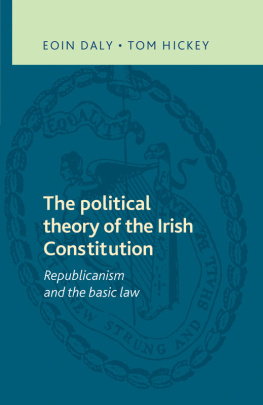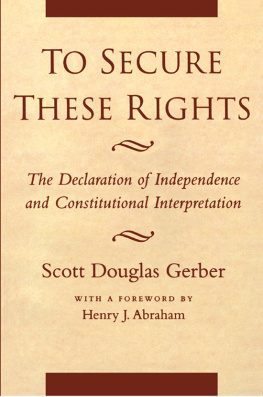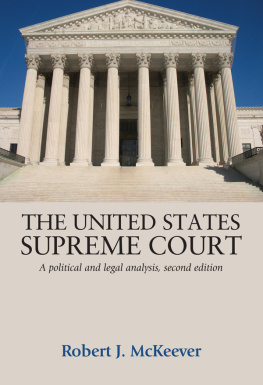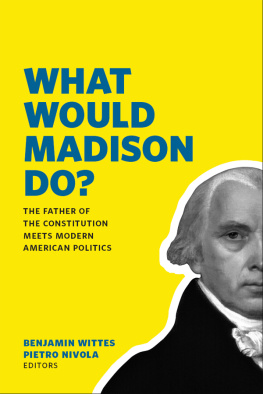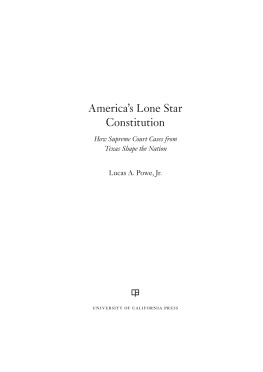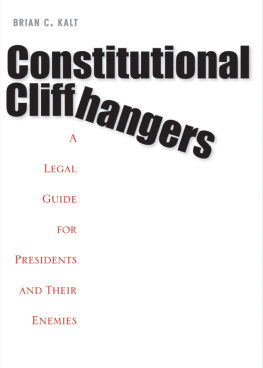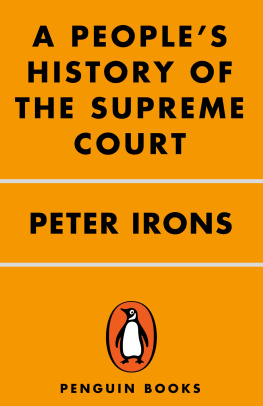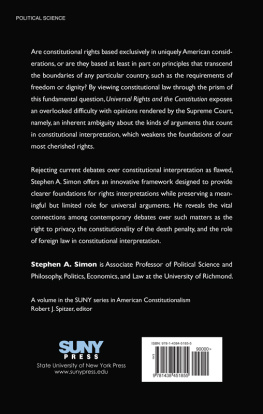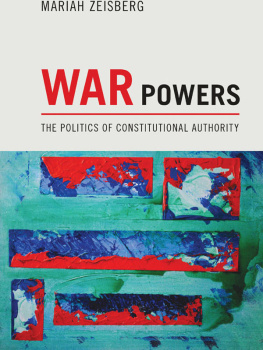Contemporary Perspectives on Constitutional Interpretation
Contemporary Perspectives on Constitutional Interpretation
Edited By
Susan J. Brison and
Walter Sinnott-Armstrong
First published 1993 by Westview Press
Published 2018 by Routledge
711 Third Avenue, New York, NY 10017, USA
2 Park Square, Milton Park, Abingdon, Oxon OX14 4RN
Routledge is an imprint of the Taylor & Francis Group, an informa business
Copyright 1993 by Taylor & Francis
All rights reserved. No part of this book may be reprinted or reproduced or utilised in any form or by any electronic, mechanical, or other means, now known or hereafter invented, including photocopying and recording, or in any information storage or retrieval system, without permission in writing from the publishers.
Notice:
Product or corporate names may be trademarks or registered trademarks, and are used only for identification and explanation without intent to infringe.
A CIP catalog record for this book is available from the Library of Congress.
ISBN 13: 978-0-8133-8394-1 (pbk)
ISBN 13: 978-0-8133-8393-4 (hbk)
To Martha and Robert Brison
S. J. B.
To Walter Armstrong, Jr.,
and in memory of Alice McKee Armstrong
W. S-A.
Contents
, Walter Sinnott-Armstrong and Susan J. Brison
, Frederick Schauer
, Robert H. Bork
, Richard A. Epstein
, Richard A. Posner
, Ronald Dworkin
, Patricia Williams
, Martha Minow
, J. M. Balkin
, Mark Tushnet
, Robin L. West
Guide
This anthology grew out of the Humanities Research Institute on Constitutional Interpretation that we directed at Dartmouth College in the fall of 1991. The institute brought together for a term scholars from various disciplines, including history, law, literature, philosophy, politics, and religion. It also sponsored a series of talks by legal theorists, which included presentations by five of the contributors to this anthology. Generous funding for the institute was provided by the Andrew W. Mellon Foundation, the National Endowment for the Humanities, the Nelson A. Rockefeller Center for the Social Sciences, and Lawrence Newman (Dartmouth Class of 1952). Additional support and encouragement came from Dean James Wright, Associate Dean Bruce Duncan, and President James Freedman of Dartmouth College. Assistant Dean Sandra Gregg provided much helpful administrative assistance.
We learned a great deal from all of the participants in the institute, and we are especially grateful to Frederick Schauer, who was the William H. Morton Distinguished Professor of the Humanities at Dartmouth in the fall of 1991 and has continued to provide invaluable advice on this project since that time.
In assembling this anthology, we were aided by the editors of the Boston University Law Review and by our research assistants, Ted Brader, Amy Candido, and Ann Marshall. We would like to thank the Presidential Scholars Program and the Faculty Research Committee at Dartmouth for funding these assistants. Spencer Carr, Shena Redmond, Marykay Scott, and Jennifer Watson, our editors at Westview Press, gave us welcome suggestions throughout the project. Nancy Davies of Humanities Computing and Gonzalo Lira, our compositor, provided expert technical assistance with the preparation of the final typescript.
Finally, we would also like to thank Thomas Trezise and Liz Sinnott-Armstrong for their patience, understanding, and companionship.
Susan J. Brison
Walter Sinnott-Armstrong
Reprinted, with deletions of some material in notes, from Boston University Law Review, vol. 72, no. 4 (September 1992), pp, 729-46. Copyright 1992 by The Trustees of Boston University. Reprinted by permission of Boston University Law Review.
) by Robert H. Bork. Copyright 1990 by Robert H. Bork.
Reprinted, with deletions of some material in notes, from Boston University Law Review, vol. 72, no. 4 (September 1992), pp. 699-727. Copyright 1992 by The Trustees of Boston University. Reprinted by permission of Boston University Law Review.
. For permission to photocopy this selection, please contact Harvard University Press.
, with deletions of some notes. Footnotes in brackets have been added by the editors. For permission to photocopy this selection, please contact Harvard University Press.
Reprinted from Michigan Law Review, vol. 87 (August 1989), pp. 2128-51. Copyright 1989 by the Michigan Law Review. Reprinted by permission of the Michigan Law Review and Patricia Williams.
Reprinted from Harvard Law Review, vol. 101 (November 1987), pp. 70-95. Copyright 1987 by the Harvard Law Review Association. Reprinted by permission of the Harvard Law Review and Martha Minow. Some notes have been deleted and others have been shortened. Material in brackets was added by the editors.
Reprinted from Cardozo Law Review, vol. 11 (1990), pp. 1613-30. Copyright 1990 by the Cardozo Law Review. Reprinted by permission of the Cardozo Law Review and Jack M. Balkin. The first sentence was rewritten for this reprint by Jack M. Balkin.
Reprinted, with revisions, from Boston University Law Review, vol. 72, no. 4 (September 1992), pp. 747-63. Copyright 1992 by The Trustees of Boston University. Reprinted by permission of Boston University Law Review.
Reprinted, with revisions, from Boston University Law Review, vol. 72, no. 4 (September 1992), pp. 765-99. Copyright 1992 by The Trustees of Boston University. Reprinted by permission of Boston University Law Review.
Walter Sinnott-Armstrong and Susan J. Brison
In 1992, the Supreme Court handed down opinions in controversial cases involving abortion, school prayer, hate speech, airport solicitation, environmental regulation, and many other issues. These opinions raise important questions about how to interpret specific constitutional provisions, and they also raise more general questions of method. How should the Court interpret the Constitution? Is there any single method of constitutional decision making that could justify all of these decisions? If only some of these decisions are justified, which are they, and how can we tell? If such decisions cannot be justified by any general method, is constitutional law no more than passing politics or even blind luck?
These questions have practical importance for judges who decide cases, for lawyers who advise clients, for presidents and senators who nominate and confirm judges, for police who investigate crimes, for attorneys-general who decide which cases to pursue, for city clerks who issue parade permits, for teachers who decide whether to silence racist views in class, and even for private citizens who want their personal decisions to conform to constitutional ideals. Constitutional interpretation also has theoretical interest for academics in many fields. It has been compared with the interpretation of literature, art, religious texts, and historical periods. Methods and theories drawn from such fields as literary theory, philosophy, political science, and economics have been used to illuminate constitutional interpretation, making it a paradigm of interdisciplinary study.
In order to understand constitutional interpretation, it is helpful to separate several issues. We will begin by discussing the nature and purpose of constitutional interpretation in general. Then we will look at each of the main kinds of reasons that are used to justify interpreting the Constitution one way rather than another. Only then can we return to the questions of whether and how these factors fit together into a general method of constitutional interpretation.

